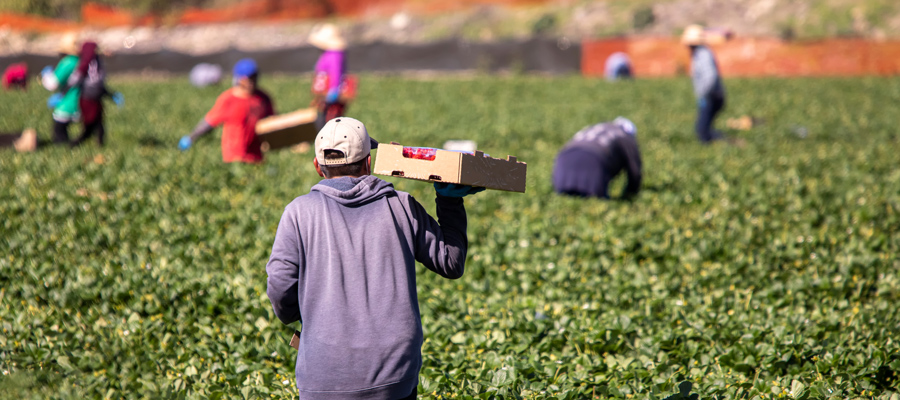By Anelyse Weiler and David Fairey
The majority of BC households are stressed because of debt and inflation. It’s even worse for one group of farmworkers who, legally, may earn less than minimum wage.
While British Columbians rang in the New Year, the provincial government quietly increased the minimum piece rate wage for farmworkers by a pitiful 2.8 per cent—their first increase since January 2019.
Meanwhile, BC’s cost of living—measured by the BC Consumer Price Index—has increased by 11.5 per cent since 2019. And a 2019 Ministry of Labour report shows that some blueberry pickers are still legally paid less than minimum wage. Will 2023 be the year the government stands up to the power of growers and supports basic fairness for farmworkers?
Many farmworkers excluded from standard BC labour protections are highly exploited, racialized recent immigrants.
Will 2023 be the year the government stands up to the power of growers and supports basic fairness for farmworkers?
If a farmer hires workers in one of 15 crops, including peaches, mushrooms or daffodils, wages can be based on the amount hand-harvested instead of an hourly wage. Hand harvesters are not only excluded from the Employment Standards Act’s hourly minimum wage provision, they are excluded from labour protections regarding hours of work, overtime pay and paid statutory holidays.
Piece rate wages are archaic and the special minimum wage legislation for hand harvesters has been racist and discriminatory since it was first introduced in 1981.
When the BC government included farmworkers under employment standards legislation, the BC Federation of Agriculture (now the B.C. Agricultural Council) pushed back. To appease growers, the government of the day established minimum piece rates for 15 types of fruits, berries, vegetables and flowers. Most of the 8,000 Canadian seasonal farm workers are older, recent South Asian immigrants, often employed by middleperson “farm labour contractors”, which severely undercuts their power to bargain for better conditions.
As shown in newly published research, BC farmworkers face wage suppression and legislated discrimination that can be traced back to industry power.
Fraser Valley blueberry farming is one of BC’s most valuable fruit crops. Not only are blueberries the province’s biggest fruit crop, they are the largest in Canada and second only to the US globally. Unsurprisingly, grower associations hold political sway.
Minimum piece rates have not kept pace with the cost of living. Temporary foreign workers who perform equivalent work in BC are guaranteed the minimum hourly wage, giving lie to employer claims that the hourly minimum wage would be too costly or require more onerous supervision.
Although growers often complain about competing with the cost of labour south of the border, all farmworkers in Washington State must earn at least the hourly minimum wage (and the law is gradually phasing in full overtime eligibility). Beyond wage issues, piece rate wages can intensify the pace of work, amplifying injury risks. And, given the likelihood of more extreme weather events like BC’s 2021 heat dome, an arduous pace of agricultural work under climate change could be more dangerous and dehumanizing.
BC farmworkers face wage suppression and legislated discrimination.
Minimum piece rate increases have lagged far behind regular minimum wage and cost of living increases.
Since the NDP government was elected six years ago, the minimum hourly wage has increased annually, by 37.9 per cent in total. Over that same period, hand harvester minimum piece rates have only increased twice—in 2017 and 2019—by a total of 11.4 per cent. From 2003 to 2022, the minimum hourly wage increased by 95.6 per cent, while hand harvester minimum piece rates increased by only 35 per cent.
It’s well past time to end the discrimination, exploitation and abuse of the hard-working people who pick BC fruit and vegetables under precarious conditions. The government-appointed Fair Wages Commission reached the same conclusion. In March 2018 the Commission recommended the hourly minimum wage should be the floor and minimum piece rates could remain as an optional incentive. While the government implemented the Commission’s recommendations to eliminate minimum wage exclusions for other workers, including liquor servers, it declined to do so for hand harvesters.
Labour Minister Harry Bains has not provided a reasonable explanation for maintaining this discriminatory minimum wage legislation, and it needs to end.
This article was originally published on CCPA-BC’s Policy Note website.

